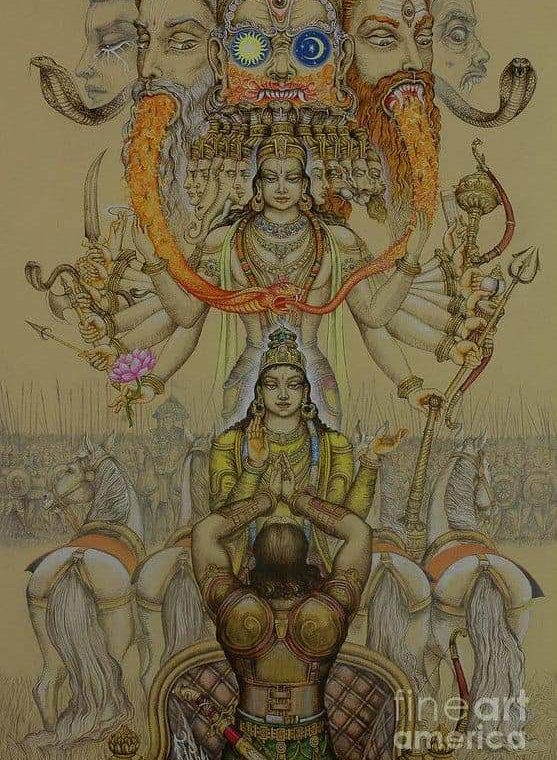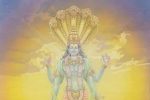Name 96
96. Sarveśvaraḥ सर्वेश्वरः
He is the Lord of lords. Māṇḍūkya Upaniṣad (6) says, “eṣa sarveśvara eśa sarvajña एष सर्वेश्वर एश सर्वज्ञ” which means ‘He is the Lord of all; He knows everything’. The Sruti in Bṛhadāraṇyaka Upaniṣad (IV.iv.22) also endorses this view by using the same phrase “Eṣa Sarveśvaraḥ”. He rules over all other Lords who have control over their own specific areas. In a sense it means the Almighty, the All-powerful.
Here, Lord refers to the Supremacy of the Brahman. He is the Supreme Lord
Sarveshvarah has two meanings:
a) One who reaches all who seek Him;
b) One who is the Isvara for all Isvaras
Sri Adi Sankara gives a simple definition ‘Sarveshaam Eeshvaranaam Eeshvarah – He is the Supreme Lord of all Lords’.
Sri Parasara Bhattar takes the view that ‘ash + varat = Eeshvarah’ with the meaning “having the power of granting success soon.” In this interpretation He is Sarveshvarah because He quickly reaches all those who have taken refuge in Him in order to give them comfort instantly and to avoid delay in dispelling their uneasiness whether they are qualified or not. Or rather, the sufficient qualification is that they have taken refuge in Him.
९६. ॐ सर्वेश्वराय नमः |
96. OM Sarveśvarāya Namaḥ
Mānḍūkyopaniṣad
Eṣa sarveśvara eṣa sarvajña eṣo’ntaryāmyeṣa yoniḥ sarvasya prabhavāpyayau hi bhūtānām. (6)
:: मान्डूक्योपनिषत् ::
एष सर्वेश्वर एष सर्वज्ञ एषोऽन्तर्याम्येष योनिः सर्वस्य प्रभवाप्ययौ हि भूतानाम् ॥ ६ ॥
This one is the Lord of all; this one is the Omniscient; this one is the inner Director (of all); this one is the Source of all; this one is verily the place of origin and dissolution of all beings.
INTERPRETATION GUIDED BY SANT VANI (WORDS OF SAINTS)
Sarveśvaraḥ
The Lord of all.
He is the Īśvara, the Lord of the entire jagat. Brahmāji, Indra, Varuṇa and such others, attained the īśvaratvam, the lordship of the various worlds, due to their severe tapas and due to their karma-phala from Him alone. He has the absolute over-lordship of all the devas also. He is the lord of the prajas too, as mentioned earlier.
As the material cause, He is sarva, all encompassing and as the maker, He is Īśvara, the Lord, the intelligent cause. The BṛhadāraṇyaUpaniṣad says, ‘eṣa sarveśvaraḥ’ (4.4.22).
The one Supreme Being who is the God of Gods.(Śaṅkara) He, who quickly reaches and saves those who have taken refuge in him.(Parāsara Battar).
That Viṣhṇu is the Supreme Being and he is the master of the entire Universe, in fact the Multiverse. This is repeated several times in the Sahasranāma – different names but with similar meanings are used to drill home this point that there is none who is above him and he alone is the goal, the refuge and final destination/resting place for all beings. It is he who pervades the world and has also entered into it – therefore it is he alone who is real – both within and without.
We have also talked about how some names are gateway-names that appear either at the beginning or end of a string and are typically gateways to either names that have great spiritual import & purport and contemplating on these names can pave and enhance the way to higher states of consciousness. In that sense ‘Om Sarveśvarāya Namaḥ‘ is a very powerful mantra-verse for the purpose of nāma–japa.
Further, there is another important reason I think for some specific names being repeated. The Viṣṇu Sahasranāma was recited by Bhīṣma Pitāmaha on the very Kṣetra that the Bhagavad-gītā was expounded by that great Kṣetrajña – the Nārāyaṇa–Svarūpa, Kṛṣṇa. In fact it was Kṛṣṇa who advised Yudhiṣṭhira to approach Bhīṣma who was on his bed of arrows and request him to speak about Dharma and what constitutes the highest Dharma and who is that one being who is the God of the Gods – the Sarveśvara – it is in this context that the Viṣṇu Sahasranāma is embedded. It is very interesting and revealing to note what Kṛṣṇa tells Yudhiṣṭhira while advising him to approach the grand old man of Dharma:
——-Quote
“Bhīṣma is on the bed of arrows like a fire slowly cooling. He is contemplating on me. My mind goes to him. He knows all divine weapons. He has in his mind all the Vedās and Vedāngas. I am now one with him by my will. O King of Bharata! he knows the past, the present and the future. My mind is with him. If this head of the family of Kurus passes away there will be the danger of knowledge declining and perishing. Hence it is that I urge you to go to him.
Kṛṣṇa then goes to Bhīṣma along with Yudhiṣṭhira and addresses the Pitāmaha as follows:
“O best of the Bharatas! What your are going to say to Dharmarāja will be ever established in the world permanently as the word of the Vedā. The past, the present and the future is clear to you, old in wisdom, as the fruit in the palm of the hand. I have known you. You have indeed the capacity to create by your penance the world of movables immovables… no decay nor ignorance nor delusion… your mind will always be clear and calm as the moon cleared of the clouds, ever rest in sattva-guna and never be affected by rajas and tamas.
Bhīṣma‘s reply is equally revealing, for, of the few who had realized early on who Kṛṣṇa really was, Bhīṣma was one of the first:
“O Govinda! By your grace and blessings, the heat of the body, doubts, languor, weariness, exhaustion, disease, have all vanished from me. I see like the fruit in the palm of my hand the past, the present and the future. O Acyutā By your grace I have been bestowed the gift of the knowledge of all the Vedās and Vedāntās. Janārdana, by constant contemplation on you I feel strong like a young and and can expound the Dharmas…“
—–Unquote
It was in such a state of complete identification with the Kṣetrajña, Nārāyaṇa–Svarūpa, Kṛṣṇa that Bhīṣma‘s transmission of the Viṣṇu Sahasranāma happened. It is because of this state that I think that Bhīṣma repeats some key names through the course of his grand discourse – moments when he realizes what state he has attained and what it means to be one with the Supreme Being of the Universe. It is said that the great Kṣetrajña, Kṛṣṇa stood with folded hands and listened to the discourse of the grand old man of Dharma…
Parāsara Battar uses the suffix ‘vara‘ of the name Sarveśvara to mean “he who pervades and reaches out to his devotees and those who seek his refuge” – he cites the examples of Vibhīṣaṇa and Vāli both of whom Rāma accepted in good faith.
PS:
Adapted from Parāsara Battar’s Bhagavad Guna Darpana; English Translation by Pudukottai Sri U. Ve. A. Srinivasa Raghavachar Swamy.
PLEASE WATCH



